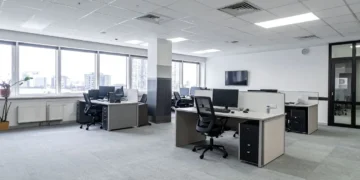- Tech 2.0 Cities Report from Cushman & Wakefield identifies 25 US tech hotspots.
- In the tech critical cities, average asking rents have increased by nearly 50%
- Cities in which construction outpaces absorption may experience some softening in office market conditions with rising vacancy and softer rents.
The tech industry is dominating the CRE sector in the US. Technology companies account for 42% of the square footage in the top 100 leases in North America, since the start of 2017. That is more than double the share accounted for by the number two industry, financial services, according to a recent report.
“The tech sector has become an important driver of economic growth and CRE markets across North America in the current cycle in a way not seen since the dot-com boom of the late 1990s,” according to the Tech 2.0 Cities report from Cushman & Wakefield.
A record 7.2 million people now work at tech companies in the US. Employment in technology industries is also growing faster than the total employment in the US during the current economic expansion, the report reveals.
The fastest growing tech employment market since 2010 is in Provo, Utah. Though a smaller market than the others on the list, the number of people employed by tech companies increased 64.9%, surpassing the 62.7% increase in San Francisco.
The impact within the CRE industry is extensive for tech-savvy cities, affecting the cost of real estate, economic markets and both the leasing and construction sectors.
The report identifies the top 25 tech-centric cities in North America based on employment, occupations, venture capital investment and demographics.
The report divides the leading “Tech 25” cities into three categories: those where tech is a “critical component”, “key driver” or “important” to the local economy and CRE market.
Here are the major findings from the Cushman & Wakefield Tech 2.0 Cities report for the CRE market.
http://cushwaketesting.com/webmaps/tech-cities/tech_cities_webmap_VID.html
Tech = Economic Growth
The report reveals these Tech 25 economies have “consistently outperformed the rest of North America during the current [economic] expansion.”
In the Tech 25, total employment has increased an average of 2.1% per year since 2010, compared to 1.4% per year for the rest of North America. The strongest job growth has, in many cases, occurred in the cities where tech is critical. Seven of the 10 tech cities with the strongest employment growth fall under the tech critical category.
“Going forward, expectations are that the Tech 25 economies will continue to grow more rapidly than the national economy. From a commercial office perspective, a stronger job growth forecast is likely to lead to more absorption in these markets than in the rest of the nation. How much this impacts local real estate conditions will depend largely on new construction. Cities in which construction outpaces absorption may experience some softening in office market conditions with rising vacancy and softer rents.”
“But in general, the continuing strength of the tech sector is likely to lead to tightening conditions, especially in tech critical markets where job growth is expected to be strongest,” the report reveals.
Tech Drives CRE Demand
Technology businesses appear to have driven demand and value in the current real estate market. Rents have increased faster in the Tech 25 than in the rest of the North American metropolitan areas and, most substantially, in tech critical cities.
In the tech critical cities, average asking rents have increased by nearly 50%. In cities where tech is identified as a key driver and important, rents increased by 29.8% and 28.1%, respectively.

Greater Property Value Growth
The report reveals that property prices in the Tech 25 have increased much more rapidly than in the rest of the nation.
In 2010, the average price per square foot (psf) for properties sold in Tech 25 cities was roughly the same as the national average at approximately $199 psf. But, by 2018, prices in the Tech 25 markets had increased 59%, to $316 psf, while for the US as a whole, prices had risen 26% to $248 psf.

Tech Dominates Leasing
“Since the local economies of the Tech 25 are more driven by the tech sector, it is no surprise that office leasing in these markets is dominated by tech companies,” according to the report.
In tech critical cities; technology companies have accounted for 27.5% of the major leases signed since 2017, for example. Of the major leases signed since the beginning of 2017 in the top five tech leasing markets, the tech sector represented roughly 40% of leases; in Silicon Valley, San Francisco and Seattle it topped 50%.
More New Construction
“Markets with a strong tech presence are growing rapidly. Since 2010, when employment began to increase in the current economic expansion, the total number of jobs in the Tech 25 increased by 18.5%. Over the same time period, employment in the rest of the country increased only 12.5%,” the report reveals.
The top four cities for new construction (completions and under construction as a percent of total inventory) are all cities where tech is a critical factor in the local real estate market. These are Austin, Raleigh/Durham, Seattle, and San Francisco.
In fact, of the top 20 new construction markets (ranked by the amount of office space under construction), 15 are Tech 25 cities.
Ones to Watch
“As tech has spread beyond its Silicon Valley roots, the dynamic growth that this sector is engendering in the economies of both the U.S. and Canada will continue to boost demand for CRE, especially in the Tech 25,” the report added.
The report identified the cities of Detroit, Houston, Phoenix, Pittsburgh and Tampa as ‘ones to watch’ in the near future. These locations provide the right balance of a positive workforce and/or venture funding characteristics, coupled will lower costs of living and doing business, especially when compared to large coastal markets.
Advancing digitisation is clearly having an impact beyond the confines of traditional tech strongholds such as San Francisco or Silicon Valley.
Speaking in a statement, Revathi Greenwood, Cushman & Wakefield’s Americas Head of Research, concludes: “Tech is no longer limited to just traditional technology companies – media companies, retailers and even law firms are competing for the same spaces and talent as traditional tech companies. While the result can be seen in nationwide trends, we’ve identified key insights that impact companies across every industry.”



 Dr. Gleb Tsipursky – The Office Whisperer
Dr. Gleb Tsipursky – The Office Whisperer Nirit Cohen – WorkFutures
Nirit Cohen – WorkFutures Angela Howard – Culture Expert
Angela Howard – Culture Expert Drew Jones – Design & Innovation
Drew Jones – Design & Innovation Jonathan Price – CRE & Flex Expert
Jonathan Price – CRE & Flex Expert












